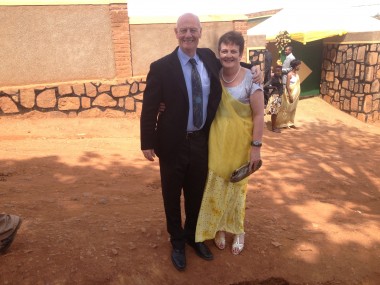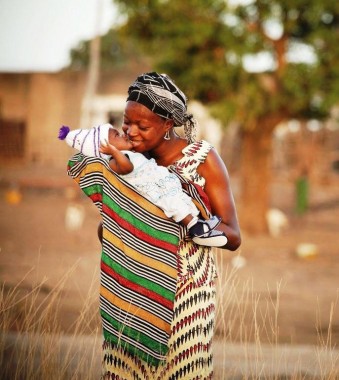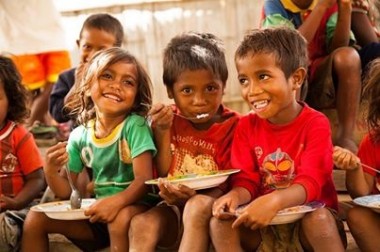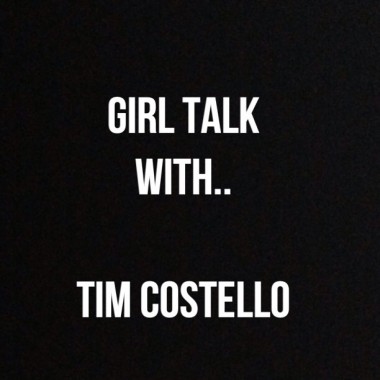“Bruce Dawe an Australia poet speaks of the withheld self in men and I think fathers often feel that with their sons. Mothers seem more able to express their feelings and emotions. So I think it’s very, very important for men with their sons to try and transcend that.” Tim Costello.
Question: How often do we get to hear ‘thinking men’ open up about relationships?
Answer: Not very.
Let’s do something about that shall we?
Tim Costello is Chief Executive of World Vision Australia, a social justice campaigner, lawyer, baptist minister, author and the brother of a former Australian treasurer.
When he’s not travelling the world tackling the issues of global poverty he is a devoted husband and dad of 3.
Martine Harte: Tim can you name a female who had a good influence on you and explain what it was about her?
Tim Costello: Well my mother. Given I went to school in the early 60’s my mother was the only woman I knew of all my friends who actually had a degree, which back then was unusual. She got a scholarship, went off to university, became a teacher then a psychologist. We in some ways were latch key kids because she was working but that was very unusual in those times and I knew my mother was somehow different. She read books, had a career, a degree, she was the equal to men in conversation or leadership so I think that was the big influence in my life.
And that wasn’t a problem to you as a young boy the fact that she was different?
Tim Costello: No I was very proud of her. She wouldn’t have called herself a feminist but that really was what she modelled.
You met your wife Merridie in Switzerland and I’ve read you were just 19 at the time. Did you immediately know she was the one for you?
Tim Costello: Immediately (laughs) sounds strange to say it, it wasn’t an audible voice or an extraordinarily intense love feeling it was just quite “that’s the girl I’m going to marry.”

Tim and his wife Merridie at a traditional wedding in Uganda last year
Really! What was it about her?
Tim Costello: She was… well the opposite of me. Quiet, thoughtful and deep. I was out there and loud and it was just a very, very strong sense. You tell people today and they think you should be in a strait jacket or locked up. And they ask,”well how many other women did you think about?” Well none! It was just her.
Lovely, how long have you been married?
Tim Costello: 34 years.
What was fatherhood like for you in the early days?
Tim Costello: Oh, it was terrific, children were the most powerful influence on my whole world. The sense of responsibility, the mystery of creation, these are little bits of me who are walking around without my smarts, so I’ve got to be protective and caring so yeah. All those sorts of feelings.
What do you tell your sons in respect to fatherhood?
Tim Costello: That it’s the greatest gift I think a man can experience and we often assume that motherhood is the key bond and of course it is, but fatherhood is emotionally centring for a man I think it is extraordinary.
Why do you think that is?
Tim Costello: I think the stereo-typing of what maternal instincts are, that they’re primary unequivocal and strong, has downplayed that they’re equally strong and intense for men. But I think the narrative around how men and women feel – children are largely for women, they need them and want them and men are the players and the ones who don’t want to be burdened – may have some empirical evidence to it but that wasn’t the experience for me.
And it’s a dangerous narrative, this had come up a couple of times, even when I interviewed James Reyne the musician for this blog, he said some really interesting things about how men are expected to behave. Essentially that is doesn’t play a valuable role in society.
Tim Costello: I think the more men that actually talkabout their feelings, their vulnerability, their emotions the strength of the paternal bond, is really important. I think it’s been very understated and even distorted.
Is there a no-brainer which you believe fathers need to inform their sons of in relation to navigating relationships.
Tim Costello: Yeah I think it’s always trickier, given the narrative, and the way men are made to have intimacy with their sons. I think women when they say, “lets have a coffee” know exactly what they’re going to do; they’re going to workshop emotions and feelings and landscapes, men drink the coffee in five minutes and go because they’ve had a coffee.
Bruce Dawe an Australia poet speaks of the withheld self in men and I think fathers often feel that with their sons. Mothers seem more able to express their feelings and emotions. So I think it’s very, very important for men with their sons to try and transcend that.
So you must have met many strong, smart women in the chapters of your life is their someone in the public eye, who has left a lasting impression?
Tim Costello: Look I think with Julia Gillard the vitriol she copped was not commensurate with anything she did. I think she was a strong woman who got judged by double standards, she knifed Kevin Rudd – well Fraser knifed Gorton and Keating knifed Hawke.
I admire her calm in her farewell speech and her resilience in what was very, very tough times. I think with maybe 30, 40 years of feminism a lot of mediocre men have missed out on promotions to women who were smarter than them. When a woman had the top office of Prime Minister a lot of men didn’t like it. I think it plugged in with some ancient fears.
What do you think is the most important thing women should know about men, I guess something fathers should tell their daughters?
Tim Costello: I think they should know that men are struggling to know what it means to be a man and they can help! That there is deep self-doubt and misgiving, from cavemen on, the hunter gatherer has been a ‘given’ role. When you’ve got spouses or partners who are earning as much or more than some men, I think there is real fear in men’s lives about, “do women really need us?” I think that struggle is actually real for men.
I think men find it hard to talk about the vulnerabilities they feel in trying to keep up with the rapid changes in society and I think women should know that and daughters should know that about their fathers.
MH: So how do women deal with that?
Tim Costello: By affirming that what I really love about you isn’t what you think you have to do to be loved. I think having that conversation is very important.
As in not bearing the sole responsibility of being the hunter gatherer although that seems an outdated concept.. is that what you mean?
Tim Costello: Yep absolutely. Being a listener: being a mentor, being someone who can be a spectator for your daughter’s netball and that emotional presence, I think men find that is not very significant work because they don’t actually get feedback but it is significant work.
What do you name as the most pressing modern issues for women?
Tim Costello: Well globally it’s still that women aren’t regarded as equal to men, in developing countries women who work with the children and out in the fields often they aren’t allowed even to handle money because that’s a man’s responsibility. Often when we do our micro-finance loans with World Vision you’ll see women in tears, when they’re given a small loan to set up a sewing business or a roadside stall. One of the reasons they are in tears is because this is the first time they’ve handled money. They aren’t trusted or treated as equals.
People who give most generously to us are women. They intuitively know that empowering women is the closest thing we’ve got to a magic bullet.

Happy mum Rawata cradling her newborn daughter in Senegal
thanks to Meg Hansen for this gorgeous pic

World Vision works with families in Timor Leste to fight malnutritionthanks to Bridie Walsh for pic

Kids in Myanmar able to have a birthday party thanks to World Vision sponsors
As Tim says there’s so much more to be done, you can read some amazing stories, donate or follow World Vision on Fbook here
